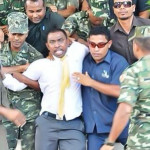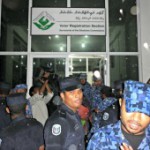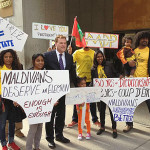The Commonwealth Ministerial Action Group (CMAG) is in the eye of a storm in Maldives. In its last meeting on 16 April it warned that it will consider “stronger measures” if the terms and reference and composition of the Maldivian National Commission of Inquiry is not “amended within four weeks in a manner that is generally acceptable and enhances its credibility”.
“Stronger measures” is probably a hint at suspension from the Commonwealth. Over two weeks have passed since that decision, now in Maldives there is talk about withdrawing the country’s membership from the Commonwealth.
How did all this come about? In the past few months, events in the Maldives have caught headlines and raised eyebrows across the world. These months saw the country’s democratic transition plagued by serious uncertainty. The most sensational part of this turn of events is mystery around the exit of former President Mohamed Nasheed.
The National Commission of Inquiry (NCI) was set up by the government to look into what transpired on the fateful day of 7 February 2012 when Vice President Mohamed Waheed Hussain took over following Mr Nasheed’s resignation – which the latter subsequently claimed was forced at gun point. The immediate backdrop for this is the military’s arrest the Chief Judge of the Criminal Court on 16 January 2012 under Mr Nasheed’s orders – a move that attracted international condemnation and regular protests in Maldives.
Mr Nasheed claimed that the judge who was under investigation by the Judicial Services Commission (JSC) represents a judiciary that is dysfunctional – while protests continued to rage and reports of a possible police mutiny began to emerge as 7 February unfolded.
Storm clouds have gathered over Maldives for long and the recent series of events are a culmination of what has been brewing for a while. Following a drawn out pro-democracy struggle in the Maldives led by Nasheed’s Maldivian Democratic Party (MDP), the 2008 Presidential elections saw Mr Nasheed contested against the incumbent Mr Maumoon Abdul Gayoom and winning – albeit by a margin of about eight percent.
The end of the 30 year regime of former President Gayoom was widely perceived as the beginning of full-fledged democracy in the Maldives. Since then, what began as a smooth ride eventually began to get bumpy. Rising prices, drug and crime issues, economic disparity, corruption allegations and concerns over the transparency of increasing foreign investments all began to cause unrest. Towards the end there were frequent public demonstrations and political standoffs.
While stalemates between the opposition dominated Parliament and the executive has been an issue, divisions also emerged between the executive and the judiciary – most of the appointments in the latter had been made during Gayoom’s tenure and the executive viewed this wing of state as being unreformed and loyal to the former regime.
The international community including the Commonwealth eased out of their heightened scrutiny of Maldives following the 2008 Presidential elections. In the aftermath the country’s nascent democracy has faced severe tribulations. Maldives is precariously located in the tip of South Asia, in the middle of strategic sea lanes making it important economically and politically both for the West and the two Asian giants – China and India. The crisis in the Maldives is an important bellwether of the edgy geopolitical climate in this region which has already found reflection in other countries of the region such as Sri Lanka.
While a lot of the current focus is mired over opposing political views within Maldives, it is important to remember that the vagaries of politics inside and outside the country should not ultimately lead to the Maldivian people viewing the values of human rights and democracy with blighted hope. It is important that these values are upheld and the protections that they afford are ensured.
An important step in doing this is to make sure that truth is both told and is seen to be told, freely sans politicisation. In this context, it is important that the National Commission of Inquiry is credible and is able to investigate and report freely and publicly. This call for credibility and impartiality has also been aptly echoed and elaborated by several Maldivian NGOs coming together in a new civil society coalition called ‘Thinvana Adu’ or ‘Third Voice’. Independent institutions in the Maldives such as the Human Rights Commission of Maldives (HRCM) and the Police Integrity Commission (PIC) should follow this lead and conduct their own parallel investigations and report publicly at the earliest.
Even though the Commonwealth should have made more early and transparent efforts to scrutinise the progress of democracy in the Maldives, it is a good sign that after years of being dormant CMAG has now taken the directions given to it in the 2011 Commonwealth Heads of Government Meeting seriously. It is also important that CMAG has recognised the need for a credible National Commission of Inquiry. If Maldives decides to leave the Commonwealth it will be the only other country after Zimbabwe to do so – a parallel that may be politically damaging for Maldives to equate itself with at this time of crisis.
R Iniyan Ilango is a Coordinator for the Strategic Initiatives Programme of the Commonwealth Human Rights Initiative.
All comment pieces are the sole view of the author and do not reflect the editorial policy of Minivan News. If you would like to write an opinion piece, please send proposals to [email protected]
 (0)Dislikes
(0)Dislikes (0)
(0)





The wealthy and the dictator Maumoon’s inner circle won’t Maldives to be an oligarchy. And they will attain their wish by bribing the police, armed force and buying the votes from uneducated public or Islanders.
Generally the local are more interested in an unseen in high above.
Although i agree with the writers assesment of the situation i was disappointed to read his statement that only Zimabwee has left the Commonwealth. The actual fact is that Burma and Fiji alongside Zimbabwee have been suspended from the Commonwealth and if you need to understand the effects of this action you only need to see thye state of these countries. The rest of the world also follow suit in that the other CW members will not support any motions that these expelled countries table on the international bodies that all countries attend IMF,EU,UN,SAARC the list goes on. So think careful withdrawing or being suspended loses the politicial punch from the CW and all the Maldives will be is a small isolated voice.Imagine you are part of a shoal of fish, you stick together to avoid the preditors,its called safey in numbers, but if you swim alone the sharks will pick you off one by one. The example being China now controls a vast amount of the former French Africian countries who dont have the same support from France on independence as CW countries, they are being raped for their Oil, minerals and valueable resources with nothing being invested for the long term of the country. China has one goal and that is to provide for itself and will see these countries destitute it achieve what it wants, it surely doesnt care for its own peoples welfare so why would it care about the people of other countries. Then i ask myself what would China want from the Maldives, you have no natural resources, you import almost everything and i'm sure it cant be for the Tuna. They may wish to build a port for their warships to operate from as a stepping stone for action against India, but i'm sure the Maldives aren't too keen in becoming the Berlin Wall of the 21st Century.It will be a sad day to see the Maldives leave the CW as this will be the beginning of the end all because of a unelected government making policies that only benefit their pockets.
The Maldives was about to become the next Singapore, but now it will be Zimbabwe.
Good writing....This power hungry wolf will take us no where except to total isolation.
The fact is that we have seen so many doomsday scenarios in the past and all turned out to be hype. In the case of commonwealth and Maldives, Its highly unlikely Maldives will loose anything because we do not depend on CW to provide us anything. Tourism will also not suffer because tourists care about the tourism product, not the lies and deception spawned by politicians.
We all thought with the departure of Gayoom and coming in of Nasheed, we got democracy. How wrong!
Since the British educated Nasheed became President every thing he did against democracy was overlooked by Britain and her club countries.
Where was the Commonwealth when:-
1. Nasheed padlocked the country's Supreme Court.
2. Nasheed forced the judicial services commission to stop work
3. Nasheed locked the Parliament .
4.Nasheed refused to let go of cabinet ministers not endorsed by the Parliament.
5.Nasheed blatantly flouted so many laws .
6 Nasheed using the military abducted the chief judge of Criminal court and held him incommunicado for over 3 weeks.
True, we would just further isolate ourselves. And true, today, in such places where previous colonial territories have lost ground, you can see energy savvy China pouring in to exploit their riches.
But, I dont' believe big brother from their port(just South of Seenu atoll) would let China take such strategic port in Maldives...
I am sure China's emerging middle class just need more beaches to go on their well earned vacation. But if Maldives eventually leave Commonwealth, they might see the Western tourists number drop, but only to be replaced by Chinese ones.
Maybe we were never meant to be the next Singapore, but the new Chinatown!
Zulfiqar Ali Bhutto took Pakistan out of the Commonwealth when Bangladesh was created and recognised.
West Pakistan lost East Pakistan.
Some years later, Pakistan was suspended because of a military coup.
So both things can happen. A member-state can leave the Commonwealth, and/ or a member state can be suspended.
Dearly beloved Maldives has a choice. It can leave of its own accord or be suspended, or even be expelled.
The present administration in the Maldives may well opt to leave the Commonwealth and join Syria, a fantastic Muslim dictatorship that is killing and maiming its own citizens everyday, simply to remain in power.
The dictatorship in Syria, and perhaps the dictatorship in the Maldives also, both want to stay in power indefinitely.
Mohamed Nasheed may have some dictatorial tendencies. If he has, and that is a very big if, it would not be surprising to me at all. Dictatorship is in the blood stream of the Maldivian people.
Despite all his faults, and he has many, I will vote for Mohamed Nasheed. He has done more than any other single individual in the Maldives, in the past or the present, to bring democracy and freedom to our country.
It is a disgrace that a man like Gayoom, who should be a religious and spiritual leader to the Maldivians, has shown so much interest in worldly matters, namely power, politics and money.
I find it difficult and painful to grasp the phenomenon called Maumoon Abdul Gayoom.
He is a product of the Middle East of his own time, and particularly Egypt.
As we can all see, Egypt and the Middle East are not good examples for the Maldives to follow.
The Gang of Four that came from Egypt with Gayoom must be blamed for much of political bull-shit that we are smelling in Male high streets today.
Long live Nasheed. Long live MDP. Long live Minivan News.
Any Commonwealth initiative on the Maldives could bring in positive results only when the Commonwealth is successful in dealing with genocidal Sri Lanka. Because,all political forces and the ruling elite in the Maldives have some kind of dependency or have the habit of seeking inspirations from Colombo.
James is right in asking the question that where was the Commonwealth when Nasheed was manipulating democracy.
But a more important question is where was the Commonwealth when the neighbouring Sri Lanka was waging a genocidal war – a more serious issue regionally and globally than the events in the Maldives.
Nasheed's Maldives was one of the abetters during Sri Lanka's war and later in the UNHRC. The Maldivian public was silent. The successor of Nasheed is no different in this matter.
Commonwealth failed in Sri Lanka cannot do anything in the Maldives and serious students of politics know who were behind the failure.
As Mohamed Ali implies, if the Maldives leave the Commonwealth the loss in the current regional context is not to the Maldives, but to the credibility of the Commonwealth.
Leaving the Commonwealth and the international organisations brokering human rights to the destiny they deserve, if the people of the Maldives really care for their own democracy and if they really think of preventing militarisation of their country, then they should first stop their politicians getting tagged behind Colombo in forming a dangerous axis in South Asia.
It is high time the people of the Maldives should start thinking and make alliances in terms of peoples of the region, rather than establishments of the region and powers operating in the region.
Glad to see a Maldivian-educated Sri Lankan writing in the interest of the country. Proud to see you have come so far young Inian.
The issue is truly to do more with the Western preoccupation with the Middle-East and other more 'interesting' arenas during the time the Maldives completely went off-track on its path to democratic consolidation.
Let us stop our Nasheed-bashing for a while as focusing on one man deters from the actual problem. Rather the Nasheed-regime and its failings are part and parcel of the problem facing us now.
The government in power has the support of the people for now and the Commonwealth would do well to factor that into any considerations. Also, what is being described as a coup was never a hostile takeover in the general sense of the word.
I would not like to pass judgments but if I were to hazard a guess it was a concerted effort by all political actors in the country to remove a regime that had already lost all its credibility and began hurtling headlong towards a dictatorship. The Nasheed-regime's flirtations with Colombo as well as Tehran during its last days is clear evidence of this fact.
The CNI does need to be strengthened and made credible in the eyes of the populace but what is more important is to strengthen our institutions and provide support for the development of the people. Democracy in the Maldives has failed to gain strength because the people whose sentiment it rests upon lacks awareness as well as the means to exercise their democratic powers.
Take one of the issues mentioned above for example; the much-maligned arrest of the Criminal Court Chief Justice;
- The Parliament was paralyzed when it took place.
- Repeated pleas by the head of the judiciary as well as the independent Prosecutor-General went ignored.
- Civil Society organizations such as Transparency Maldives refused to make a public stand on the issue.
- Public outrage was colored by the finance and direction of political parties.
- A number of people actually ENDORSED the idea of locking an individual up outside the democratic process believing that it would be a solution to their problems (this belief alone is enough to challenge any assumption that democracy has satisfactorily taken root in this country).
Inian my friend, I have known you since you were a babe, and my advice to you would be to stay away from the hype and hooplah and provide a balanced assessment of the situation. Focus on the populace as well as those institutions that have been created to protect the rights of the people. Nasheed was no messiah, no savior of the people as the certain sections of the foreign media have repeatedly tried to paint him as - not so far as the common man is concerned in the Maldives.
Shall we make our progress from this point onward and stop our focus on funding megalomaniacs and would-be despots?
This Kaaminee family is not going to leave us 30 years was enough to make money this old man is still hungry for our country its time now to prepare for the hereafter rather than doing this dirty politics